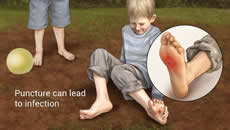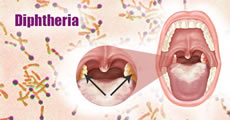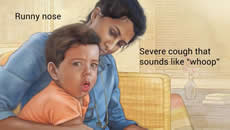Tetanus, Diphtheria & Pertussis
On this page
Tetanus
 | Tetanus, also called lockjaw is a serious bacterial infection that causes painful muscle spasms and can lead to death. Tetanus is a potentially fatal bacterial infection that affects the nerves. A vaccine can easily prevent the infection, which has no cure. |
- Preventable by vaccine
- Treatable by a medical professional
- Spreads by contact with a contaminated object or surface
- Requires a medical diagnosis
- Lab tests or imaging not required
- Medium-term: resolves within months
How it spreads
- By touching a contaminated surface (blanket or doorknob)
Symptoms
Tetanus requires a medical diagnosis that may cause painful muscle contractions, particularly in the jaw and neck. It can interfere with the ability to breathe, eventually causing death.
- Whole body: fever, high blood pressure, nervous system dysfunction, or sweating
- Muscular: muscle spasms, facial muscle spasms, or stiff muscles
- Respiratory: episodes of no breathing or shortness of breath
- Also common: lockjaw, difficulty swallowing, drooling, fast heart rate, irritability, spasm with arched back and neck, or stiff neck
Treatment
Treatment consists of antibiotics and supportive care that focuses on managing complications.
- Preventative:
- Tdap Vaccine (Tetanus, Diphtheria & Pertussis)
- Medication:
- Antibiotics: Stops the growth of or kills bacteria
- Penicillin antibiotic: Stops growth of or kills specific bacteria
- Sedative: Causes drowsiness, calmness and dulled senses. Some types may become addictive
- Dietary supplement: Works alone or in conjunction with other treatments to promote health
- Supportive care:
- Mechanical ventilation: Using a machine to move air in and out of the lungs when a person cannot breathe on their own
- Medical procedure:
- Tracheostomy: Surgically creating a hole in the neck that leads into the windpipe (trachea). Often used to insert a breathing tube
- Removal of unhealthy tissue: Removal of dead, damaged or infected tissue from wounds to promote healing
- Specialists:
- Infectious Disease Doctor: Treats infections, including those that are tropical in nature
- General Practitioner (GP): Prevents, diagnoses and treats diseases
- Critical Care Doctor: Monitors and treats those in intensive care
- Immunologist: Diagnoses and treats immune system disorders
- Paediatrician: Provides medical care for infants, children and teenagers
- Emergency Medicine Doctor: Treats patients in the emergency department
For more information
For technical information or information about vaccines
Diphtheria
 | Diphtheria is a serious infection of the nose and throat that’s easily preventable by a vaccine. A sheet of thick, grey matter covers the back of the throat, making breathing hard. " |
- Preventable by vaccine
- Treatable by a medical professional
- Spreads easily
- Requires a medical diagnosis
- Lab tests or imaging always required
- Short-term: resolves within days or weeks
How it spreads
- By airborne respiratory droplets (coughs or sneezes)
- By saliva (kissing or shared drinks)
Symptoms
Requires a medical diagnosis: includes sore throat, fever, swollen lymph nodes and weakness.
- Whole body: chills, fatigue, fever, or malaise
- Respiratory: noisy breathing or shortness of breath
- Skin: rashes or ulcers
- Speech: hoarseness or impaired voice
- Throat: difficulty swallowing or soreness
- Also common: coughing, muscle weakness, runny nose, swelling, or swollen lymph nodes
Treatment
Treatment consists of antibiotics and an antitoxin that neutralises the diphtheria toxin. A vaccine is available.
- Preventative:
- Tdap Vaccine (Tetanus, Diphtheria & Pertussis)
- Medications:
- Antibiotics: Stops the growth of or kills bacteria
- Penicillin antibiotic: Stops the growth of or kills specific bacteria
- Specialists:
- Infectious Disease Doctor: Treats infections, including those that are tropical in nature
- Paediatrician: Provides medical care for infants, children and teenagers
- Otolaryngologist: Treats ear, nose and throat disorders
- Emergency Medicine Doctor: Treats patients in the emergency department
For more information
For technical information or information about vaccines
Pertussis
 | Whooping cough, also called pertussis is a highly contagious respiratory tract infection that is easily preventable by vaccine. It is particularly dangerous for infants; therefore, it is highly recommended for anyone who will be in contact with babies. Whooping cough vaccines are currently funded by Queensland Government for all women in their third trimester of pregnancy (28-32 weeks) and are recommended in each pregnancy. |
How it spreads
- By airborne respiratory droplets (coughs or sneezes)
- By saliva (kissing or shared drinks)
- By skin-to-skin contact (handshakes or hugs)
Symptoms
Requires a medical diagnosis, besides a cough that sounds like “whoop”, symptoms include a runny nose, nasal congestion and sneezing.
- Cough: can be chronic or severe
- Nasal: congestion, runny nose, or sneezing
- Whole body: fatigue or fever
- Also common: paroxysmal cough, episodes of no breathing, vomiting, or watery eyes
Treatment
Treatment includes antibiotics.
- Medications:
- Antibiotics: Stops the growth of or kills bacteria
- Preventative:
- Tdap Vaccine (Tetanus, Diphtheria & Pertussis)
- Supportive care:
- Monitoring for changes or improvement: monitoring a medical condition instead of taking action right away
- Specialists:
- General Practitioner (GP): Prevents, diagnoses and treats diseases
- Paediatrician: Provides medical care for infants, children and teenagers.
For more information
For technical information or information about vaccines
Tdap Vaccine
Tetanus, Diphtheria and Pertussis (Tdap) Vaccine (PDF file, 281.3 KB) can protect adolescents and adults from these diseases. One dose of Tdap is routinely given at age 11 or 12. People who did not get it at that age should get it as soon as possible.
Tdap is especially important for healthcare professionals and anyone having close contact with a baby younger than 12 months. Tdap booster should be given every 10 years. It may also be given after a severe cut or burn to prevent tetanus infection. This vaccine can be given at the same time as other vaccines.
Please tell the Doctor if you have ever had a life-threatening allergic reaction after a previous dose of any Tdap containing vaccine, or had a severe allergy to any part of this vaccine. It is important to let us know if you have ever had coma or long repeated seizures within 7 days after a childhood dose of Tdap. If you have seizures or another nervous system problem, severe pain or swelling after any Tdap containing vaccine, ever had Guillain-Barre Syndrome or are not feeling well on the day, vaccine should be postponed.
Dosage and Administration
The dose of Tetanus, Diphtheria and Pertussis vaccine is 0.5mL, to be given by intramuscular injection.
What do you have to do?
Book in to consult one of our Doctors today if you have any symptoms or if you would like the vaccine.